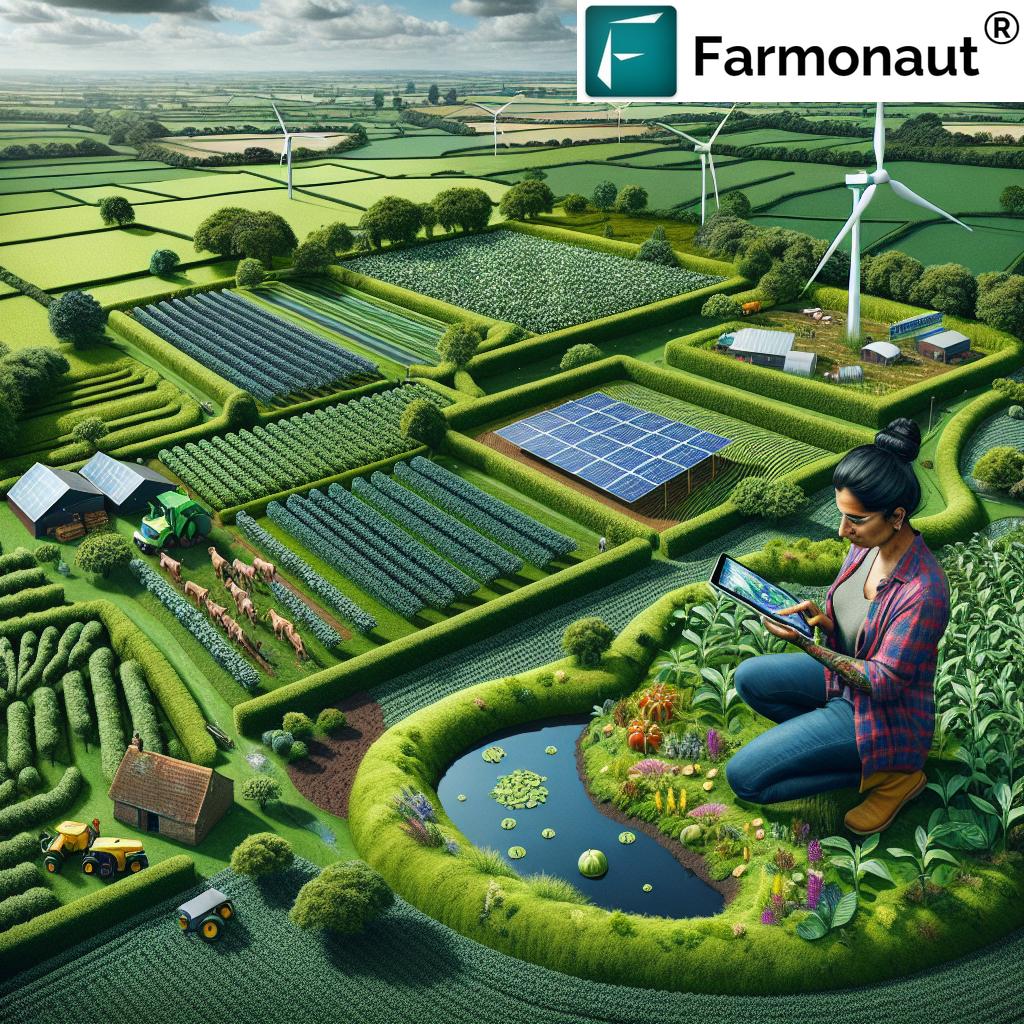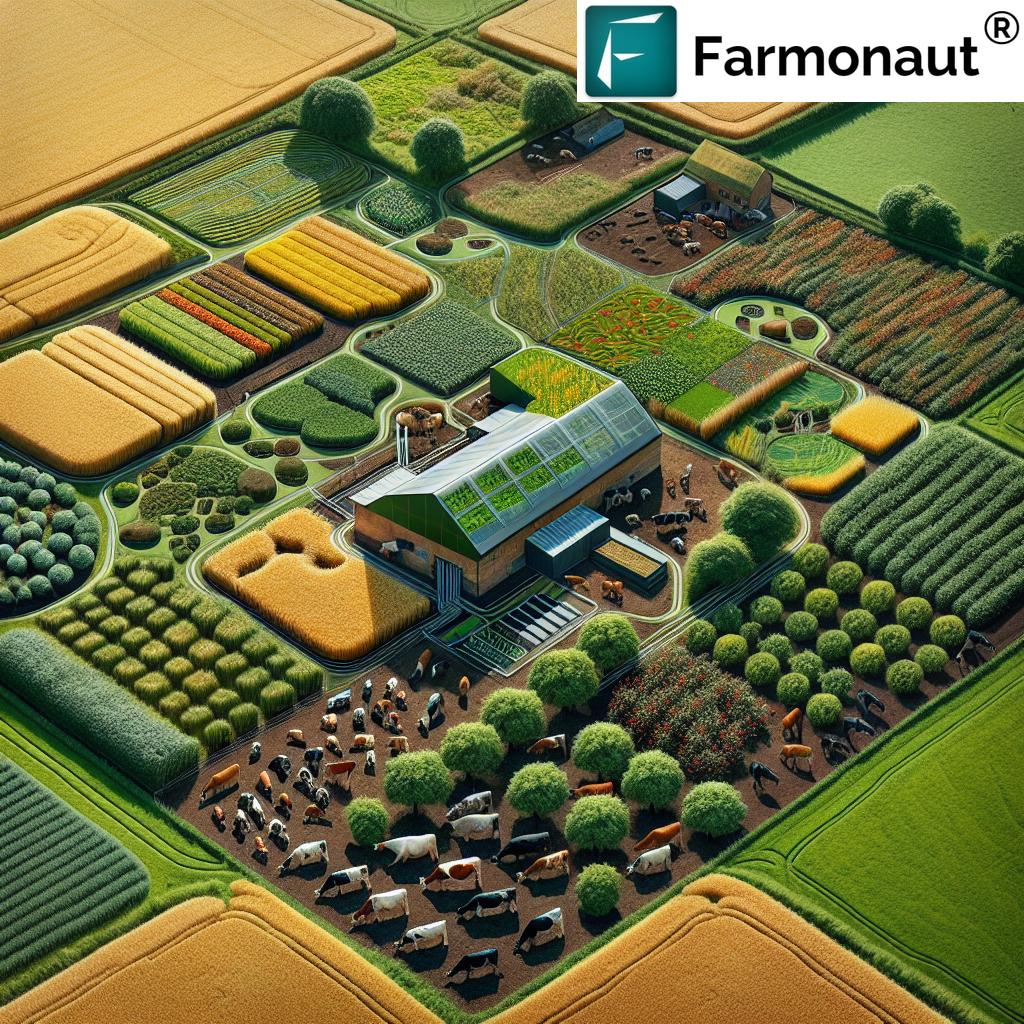UK Farmers Lead the Way: Sustainable Agriculture Strategies for Climate-Friendly Food Production
“UK farmers aim to achieve net-zero emissions while maintaining high productivity in sustainable agriculture.”
In the face of global climate change, the UK agricultural sector is stepping up to the plate, demonstrating remarkable innovation and commitment to sustainable farming practices. As we delve into the world of climate-friendly food production, we’ll explore how British farmers are not just adapting to environmental challenges but actively leading the charge towards a more sustainable future.
At Farmonaut, we’re proud to support this green revolution in agriculture with our cutting-edge satellite-based farm management solutions. Our technology empowers farmers to make data-driven decisions that optimize resource use and minimize environmental impact.

The Evolution of UK Agriculture Towards Net-Zero Emissions
The UK farming industry has set an ambitious goal to reach net-zero greenhouse gas emissions by 2040, a full decade ahead of the national target. This commitment reflects the sector’s recognition of its crucial role in combating climate change and ensuring food security for future generations.
- Reduction of agricultural carbon footprint
- Implementation of sustainable agriculture practices
- Adoption of climate-friendly food production methods
To achieve these objectives, farmers across the UK are implementing a range of innovative strategies that not only reduce emissions but also enhance productivity and resilience.
Innovative Strategies for Environmental Management in Farming
UK farmers are at the forefront of adopting environmental management systems that holistically address the challenges of sustainable agriculture. These systems integrate various aspects of farm operations to minimize negative impacts on the environment while maximizing efficiency and output.
Water Conservation in Agriculture
Water management is a critical component of sustainable farming. UK farmers are implementing advanced irrigation techniques and water-saving technologies to reduce consumption and improve efficiency.
- Precision irrigation systems
- Rainwater harvesting
- Drought-resistant crop varieties
By leveraging Farmonaut’s satellite-based crop health monitoring, farmers can accurately assess soil moisture levels and optimize irrigation schedules, leading to significant water savings.
Renewable Energy Integration in Farming
The integration of renewable energy sources into farm operations is rapidly gaining traction across the UK. This shift not only reduces the carbon footprint of farms but also provides long-term economic benefits.
- Solar panels on farm buildings
- Wind turbines in suitable locations
- Biomass energy from agricultural waste
Farmonaut’s resource management tools help farmers track their energy usage and identify opportunities for integrating renewable sources, contributing to a more sustainable energy mix on farms.
Food Waste Reduction Strategies
Addressing food waste is crucial for creating a more sustainable food system. UK farmers are implementing various strategies to minimize waste at the production level:
- Improved storage and handling techniques
- Direct-to-consumer sales to reduce transit losses
- Valorization of byproducts and surplus produce
Our AI-based advisory system, Jeevn AI, provides farmers with insights on optimal harvesting times and storage conditions, helping to reduce post-harvest losses and extend the shelf life of produce.
The Importance of Hedgerows and Tree Planting in Carbon Storage
“Hedgerows and tree planting on UK farmland play a crucial role in enhancing carbon storage and biodiversity.”
One of the most visually striking aspects of the UK’s sustainable farming revolution is the renewed focus on hedgerows and tree planting. These natural features offer multiple benefits:
- Enhanced carbon sequestration
- Improved biodiversity
- Natural pest control
- Reduced soil erosion
Farmonaut’s satellite imagery can help farmers identify optimal locations for hedgerow and tree planting, ensuring these initiatives complement existing crop patterns and maximize environmental benefits.
Agricultural Greenhouse Gas Emissions: A Complex Challenge
Understanding and addressing agricultural greenhouse gas emissions is a complex task. The UK farming sector contributes to emissions through various processes:
- Livestock methane emissions
- Soil management practices
- Energy use in farm operations
However, it’s important to note that agriculture also has unique potential for carbon sequestration through proper land management and crop selection.
Farmonaut’s carbon footprinting feature allows farmers to track their emissions in real-time, providing valuable data for implementing reduction strategies and monitoring progress towards net-zero goals.

Comparing Agricultural Emissions to Other Sectors
While agriculture is a significant contributor to UK greenhouse gas emissions, it’s essential to view these emissions in context. Let’s compare agricultural emissions to other major sectors:
| Sector | Percentage of UK Emissions | Key Challenges |
|---|---|---|
| Agriculture | 10% | Livestock emissions, soil management |
| Transport | 27% | Vehicle emissions, aviation |
| Energy Supply | 21% | Fossil fuel dependence |
| Business | 17% | Industrial processes, commercial energy use |
| Residential | 15% | Heating, electricity consumption |
This comparison highlights that while agriculture has a significant role to play in emissions reduction, it’s part of a broader national effort across all sectors.
Creating a More Sustainable Food System: From Farm to Fork
Achieving a truly sustainable food system requires a holistic approach that considers every stage of the food production and consumption cycle. UK farmers are actively engaging in initiatives that address sustainability beyond the farm gate:
- Shortening supply chains
- Improving traceability
- Promoting sustainable consumption patterns
Farmonaut’s blockchain-based traceability solutions support these efforts by providing transparent, verifiable information about the journey of food products from farm to consumer.
Farmonaut: Revolutionizing Resource Management in Agriculture
At Farmonaut, we’re proud to be at the forefront of the agritech revolution, providing cutting-edge solutions that empower farmers to optimize their operations and reduce their environmental impact. Our suite of tools includes:
- Satellite-based crop health monitoring
- AI-driven advisory systems
- Blockchain-based traceability
- Resource management tools
These technologies are helping farmers make data-driven decisions that improve efficiency, reduce waste, and contribute to a more sustainable agricultural sector.
Explore our solutions:
The Future of Farming: Balancing Environmental Stewardship and Food Production
As we look to the future, the challenge for UK agriculture will be to balance the growing demand for food production with the urgent need for environmental stewardship. Innovative technologies and practices are key to achieving this balance:
- Precision agriculture techniques
- Vertical farming in urban areas
- Gene editing for resilient crop varieties
- Agroforestry systems
Farmonaut’s platform is continuously evolving to support these emerging trends, providing farmers with the tools they need to stay at the cutting edge of sustainable agriculture.
The Pivotal Role of Farmers in Climate Change Mitigation
UK farmers are not just food producers; they are stewards of the land and key players in the fight against climate change. Their role extends beyond reducing emissions to actively sequestering carbon and enhancing biodiversity:
- Implementing regenerative agriculture practices
- Managing and restoring peatlands
- Creating wildlife corridors and habitats
By leveraging Farmonaut’s technologies, farmers can quantify their environmental impact and showcase their contributions to climate change mitigation.
The Path to a Greener Agricultural Economy
The transition to sustainable agriculture is not just an environmental imperative; it’s also an economic opportunity. The UK is well-positioned to become a global leader in green agricultural technologies and practices, creating new jobs and export opportunities in the process.
- Development of new sustainable farming technologies
- Growth in the organic and locally-sourced food markets
- Expansion of agri-tourism focused on sustainable practices
Farmonaut is committed to supporting this green economic growth by providing farmers with the tools they need to thrive in this new agricultural paradigm.
UK Sustainable Agriculture Strategies Comparison
| Strategy | Environmental Impact | Implementation Difficulty | Estimated CO2 Reduction (tonnes/year) |
|---|---|---|---|
| Water Conservation | Reduced water usage, improved soil health | Medium | 5,000 – 10,000 |
| Renewable Energy Integration | Reduced reliance on fossil fuels, lower emissions | High | 20,000 – 30,000 |
| Food Waste Reduction | Less landfill waste, more efficient resource use | Medium | 15,000 – 25,000 |
| Hedgerow Planting | Increased biodiversity, carbon sequestration | Low | 2,000 – 5,000 |
| Precision Agriculture | Optimized resource use, reduced chemical inputs | High | 10,000 – 20,000 |
This table provides a clear comparison of various sustainable agriculture strategies, highlighting their potential impact and implementation challenges. It’s important to note that the CO2 reduction figures are estimates and can vary based on specific implementation and scale.
Conclusion: A Sustainable Future for UK Agriculture
As we’ve explored throughout this article, UK farmers are at the forefront of the global movement towards sustainable agriculture and climate-friendly food production. By embracing innovative technologies, implementing environmental management systems, and adopting practices that enhance carbon storage and biodiversity, the UK agricultural sector is setting a powerful example for the world to follow.
At Farmonaut, we’re proud to support this vital transition with our advanced satellite-based farm management solutions. By providing farmers with real-time data and actionable insights, we’re helping to drive the shift towards a more sustainable, productive, and resilient agricultural sector.
The path to net-zero emissions in agriculture is challenging, but with continued innovation, collaboration, and commitment, UK farmers are well-positioned to lead the way towards a greener, more sustainable future for food production.
FAQ Section
Q: What is sustainable agriculture?
A: Sustainable agriculture refers to farming practices that meet society’s present food needs without compromising the ability of future generations to meet their own needs. It involves methods that protect the environment, public health, human communities, and animal welfare while producing nutritious food and viable farm income.
Q: How are UK farmers reducing their carbon footprint?
A: UK farmers are reducing their carbon footprint through various methods, including implementing precision agriculture techniques, integrating renewable energy sources, improving soil management practices, planting hedgerows and trees for carbon sequestration, and adopting more efficient livestock management systems.
Q: What role does technology play in sustainable farming?
A: Technology plays a crucial role in sustainable farming by enabling precision agriculture, which optimizes resource use and reduces waste. Tools like satellite imagery, AI-driven advisory systems, and IoT sensors help farmers make data-driven decisions that improve efficiency and reduce environmental impact.
Q: How can consumers support sustainable agriculture?
A: Consumers can support sustainable agriculture by choosing locally sourced, seasonal produce, reducing food waste, supporting farmers’ markets and CSA programs, and being mindful of the environmental impact of their food choices. Additionally, learning about and advocating for sustainable farming practices can help drive broader change in the food system.
Q: What is the government’s role in promoting sustainable agriculture?
A: The UK government plays a vital role in promoting sustainable agriculture through policy-making, providing financial incentives for sustainable practices, funding research and development in agricultural technologies, and setting regulatory frameworks that encourage environmental stewardship in farming.
For more information on how Farmonaut can support your sustainable farming journey, visit our API Developer Docs or explore our API for integrating our solutions into your existing systems.






